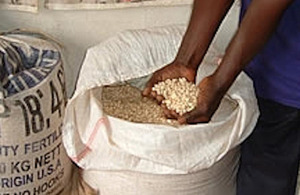DFID Research: Encouraging growth in Africa's seed industry
A DFID-supported programme provides business development services to small and medium-sized seed companies in Eastern and Southern Africa.

Seeds. Small and medium-sized seed companies are supported by SODP
Launched in 2003, and funded by DFID since 2005, the Seeds of Development Program (SODP) has a network of 30 seed companies in 7 East and Southern African countries.
“To achieve any green revolution you must start with the right inputs, and seed is often the only input that smallholder farmers can afford. It is critical that we have seed systems that work,” says Josephine Okot, managing director of Victoria Seeds Ltd, in Uganda.
Having faced start-up challenges as a woman entrepreneur, in 4 years Okot has grown her company into a dependable seed house exporting to regional markets. Valued support in developing her business has been given by SODP, a Market Matters Inc. project whose activities focus on emerging markets. Okot reports that workshop training provided by the project “has helped us improve our skills in seed marketing, distribution and processing.”
Meeting local needs
Committed to meeting the needs of Uganda smallholder farmers, Victoria Seeds sells over 50 varieties of seeds, including pigeon pea, groundnut, sesame, soyabean, maize, rice, sorghum and millet, as well as various vegetable varieties, through a countrywide network of over 400 Retailers. In addition, the company contracts over 200 growers - mostly women’s groups - to produce its seed.
Seed-Tech in Malawi, another SODP-supported seed company, produces, markets and distributes certified seed released by national research institutions to farming communities in a sustainable and affordable way. Hybrid maize MH18 was the first seed handled by the company in 2004. An early-maturing variety, it stores particularly well as it is resistant to weevils, a major problem for farmers storing seed during the dry season.
With support from SODP and a grant from the Alliance for a Green Revolution in Africa, Frank Samidu, owner of Seed-Tech, has been able to lease a warehouse and sell in bulk, increasing his annual output from 23 tonnes to around 100 tonnes this year. Additional capital has also allowed him to purchase a seed grading machine. Mr Samidu expects his output to double in 2009.
A positive transformation
Supporting SODP member companies are all offered training, distance learning, and field visits. They are also provided with an opportunity to gather at an annual seed trading forum, and to benefit from research conducted by the Emerging Markets Program at Cornell University, which guides private company strategies and informs governments on seed industry policies and regulations.
Seed policies and regulations currently differ across African countries, limiting opportunities for trade and collaboration. However, efforts are underway to harmonise the seed industry for regional trading blocs. For example, across the 14 Southern Africa Development Community (SADC) countries, seed industry stakeholders have been formulating a single policy document to enable companies to move seed and germplasm across national borders, register varieties more easily and market their products regionally. A parallel initiative is underway for three East African countries.
Whilst SODP continues to support new members to join the network, SODP director Ed Mabaya hopes that some of the activities will become self-sustaining with more of the costs and services being provided by the seed companies themselves. Meanwhile, he reports that almost all SODP-supported companies have experienced growth, offering a greater variety of seeds to farmers, including higher yielding, disease and drought-resistant varieties, as well as other inputs such as fertilisers. Company data shows that more than 80% of sales go to smallholder farmers.
More information
Read article in New Agriculturalist: Reaping what you sow.